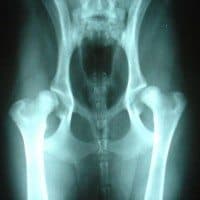The uncanny canine ability to detect smells that escape the human nose could be used for the early detection of lung cancer, according to new study. It is the first study to show that “sniffer” dogs can be relied upon to find the unique smell of the disease in seven out of 10 sufferers.
This latest study used family dogs including German and Australian Shepherds and a Labrador Retriever, which were given special training over an 11-week period to identify volatile organic compounds (VOCs) in the breath of patients.
The researchers worked with 220 volunteers, including patients with lung cancer at early and advanced stages, patients with chronic obstructive pulmonary disease and healthy volunteers. The dogs took part in a number of tests to see if they could reliably distinguish compounds in the breath of lung cancer patients and even if they smoked.
The dogs were asked to sniff glass tubes containing cotton impregnated with samples of breath from those taking part in the study and had to lie down if they detected a VOC from a lung cancer patient.
The dogs successfully identified 71 samples with lung cancer out of a possible 100. They also correctly detected 372 samples that did not have lung cancer out of a possible 400.
“In the breath of patients with lung cancer, there are likely to be different chemicals to normal breath samples and the dogs’ keen sense of smell can detect this difference at an early stage of the disease,” said study leader Thorsten Walles of Schillerhoehe Hospital in Germany where the study was conducted.
“It is unfortunate that dogs cannot communicate the biochemistry of the scent of cancer,” said thoracic surgeon and fellow researcher Enole Boedeker. Boedeker also said the dogs “were very excited by the ‘game’ and were rewarded by treats when they got it right.”
Previously, research and anecdotal reports suggested dogs, usually Labrador Retrievers and Portuguese Water dogs, can sniff out bladder, skin, lung, breast and ovarian cancers.
Lung and breast cancer patients are known to exhale patterns of biochemical markers on their breath, which can be traced to tumors which exude tiny amounts of chemicals not found in healthy tissue.
Trained dogs have also picked up skin cancer melanomas by sniffing skin lesions, while even domestic pets have raised the alarm with agitated behavior that led their owners to seek medical advice.
Professor Stephen Spiro, deputy chairman of the British Lung Foundation and lung cancer specialist, said, “A dog is said to be a man’s best friend and this breakthrough could show that our canine counterparts could offer more than companionship.”


so nice and sweet post! thnsk!!!!
Lung cancer patients are known to exhale patterns of
biochemical markers on their breath, which can be traced to tumors which
exude tiny amounts of chemicals not found in healthy tissue.Trained dogs have also picked up skin cancer melanomas by sniffing
skin lesions, while even domestic pets have raised the alarm with
agitated behavior that led their owners to seek medical advice.